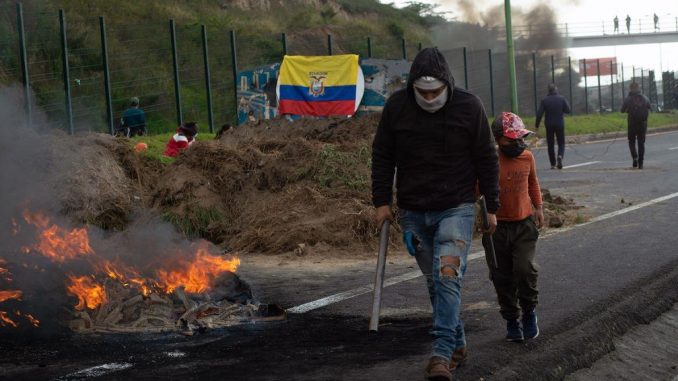
By Alberto Giovanelli
This last week the Confederation of Indigenous Nationalities of Ecuador – CONAIE and different social organizations, began a national and indefinite mobilization. In response, the Government of Lasso informed this Tuesday 14th the arrest of Leonidas Iza, main leader of CONAIE. During these hours the protest installed concentrations, pickets and roadblocks in several regions and the mobilization is growing throughout the length and breadth of the country.
The protest confronts President Guillermo Lasso and his entire economic policy, which as in all of Latin America, is one of absolute submission to the IMF and which needs to be combined with new acts of repression to confront the demands of indigenous peoples, peasants and the different social movements.
The mobilizations are made around a list of demands, which basically revolve around: 1. A protest against the increase in fuel prices, 2. 1 year extension of time in the financial system so that families can pay their debts, 3. No to mining in indigenous territories and water sources, 6. Respect for collective rights, 7. No to the privatization of strategic sectors, 8. Policies to control and fight against price speculation, and 9. Urgent budget for health and education, among other things.
These demands are an almost identical replica to those demanded in October 2019 when the popular mobilization also cornered the government of Lenin Moreno, predecessor of Lasso, which could be sustained only by the negotiations that CONAIE’s own leadership made behind the backs of the people with the weakened government. Today, the continuity of the fights, worsened by the social crisis unleashed by the pandemic, unmask, if necessary, the impossibility of finding solutions within the context of the terminal crisis of capitalism.
As soon as the “strike for an indefinite period” was announced last weekend by CONAIE and social organizations, Lasso threatened with the use of repressive force, “warning” that the government would not allow the closing of highways, nor the seizure of oil wells and any public service. “Actions that are prohibited by the Constitution and the laws”, said Lasso with the typical haughty tone that characterizes him. We must understand that the detention of IZA and the repression of students that was unleashed in Quito on the night of Monday the 13th are the result of the execution of those threats.
In addition to the economic crisis, the country is in a social crisis of great depth, where, for example, in less than 16 months, six prison massacres have left at least 372 prisoners murdered. That is why, in addition to applying severe economic plans that increase misery, now, with the argument of insecurity, they are voting for more repressive laws. Thus, the law of “progressive use of force” was presented once again in the National Assembly (parliament), which in the end, with the argument of fighting insecurity, includes articles so that the repressive agencies of the State, such as the police and the Armed Forces, violate elementary democratic liberties and facilitate greater repression against the population.
The arrest of Iza and the repression in Quito, causes at this time the radicalization of the measures by the sectors that are mobilizing, so it remains to be expected that in the coming days the protest will spread and intensify, including sectors of the urban working class, in spite of the delay of the traditional union leaderships to express their support to the new process of resistance and popular offensive.
Finally, the terminal crisis of Correism makes it almost impossible for that sector of the “Citizen Revolution” to play any progressive role in this process. Its leaders only refer in some cases to declarations of commitment.
Once again the Ecuadorian people demonstrate their willingness to struggle and that is why we revolutionary socialists participate in them and at the same time we propose the urgent need to build an anti-capitalist, socialist and revolutionary alternative that prevents this new process from being channeled and diverted by unreliable leaderships, as unfortunately has already happened on several occasions. This is our commitment.








